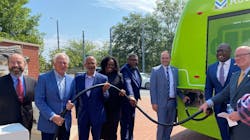Rock Region Metro launches first five zero-emission buses
Rock Region Metro has launched its first five zero-emission buses, the first in Arkansas. The 40-foot Proterra ZX5 Max vehicles will be placed in service on area streets in July following additional staff training. The buses were primarily funded by a 2021 $4.9 million “Shock the Rock” Federal Transit Administration 5339 Bus and Bus Facilities competitive grant, the agency’s largest competitive grant award to date, to purchase the buses and their related charging infrastructure.
“The Rock Region Metro team is proud to contribute to a more sustainable future by operating Arkansas’ first electric mass transit buses,” said Justin Avery, Rock Region Metro CEO. “Sharing your ride just got even more sustainable.”
The battery electric buses have an operating range of 220 to 340 miles and operate with 738 kWh of power. Rock Region Metro has installed three Proterra Charging Systems Industrial Series 180kW charging cabinets at its headquarters that offer two 300-amp dispensers per cabinet, allowing all five vehicles to charge simultaneously if desired. The battery electric buses have batteries with 12-year warranties, mirroring the FTA’s 12-year “useful life” designation for tracking mass transit bus asset conditions and investments. The vehicles are the first Proterra vehicles in the Rock Region Metro fleet and in Arkansas.
The first few months of operation will involve a charging management evaluation, as numerous factors affect the maximum operational range, including temperature, HVAC settings, driver behavior and terrain. Rock Region Metro will rotate the buses among Routes 3 Baptist Medical Center, 5 West Markham, 8 Rodney Parham, 10 McCain Mall, 14 Rosedale, 22 University Ave./Mabelvale and 23 Baseline/Southwest, which are the seven routes of the agency’s 15 fixed routes that can support a 40-foot long vehicle (as opposed to a 35-foot vehicle, which has a tighter turning radius).
“As the state’s largest public transit agency, serving Arkansas’ urban core, we are accustomed to being the agency taking on new learning curves and our foray into electric buses is no different than other Rock Region Metro ‘firsts’ in that respect,” Avery said. “We are thankful to our supporters, including the Arkansas federal delegation, for understanding the critical need to diversify our fleet with locally-produced alternate fuel options to ensure service stability and sustainability.”
The battery electric buses addition to the fleet means Rock Region Metro will remove the last diesel buses in its fleet from service, effectively achieving a goal to complete its transition away from diesel-fueled vehicles by the end of 2025. This initiative fulfills the U.S. Department of Transportation Strategic Plan FY 2022-2026 climate and sustainability strategic objectives to reduce air pollution and greenhouse gas emissions from transportation and advance a sustainable transportation system, as well as address the disproportionate negative environmental impacts of transportation on disadvantaged communities.
It meets Arkansas Department of Transportation Long-Range Intermodal Transportation Plan objectives to support multimodal transportation alternative and intermodal mobility and to support initiatives to reduce congestion and improve air quality, and it fulfills Metroplan Central Arkansas 2050 long-range transportation plan goals to foster quality corridors and transportation choice, support environmental quality and sustainable energy efforts, sustain healthy and safe communities and promote economic growth and vitality.





